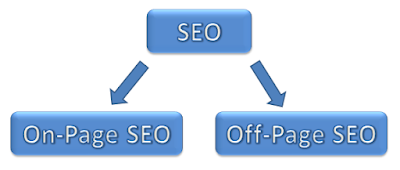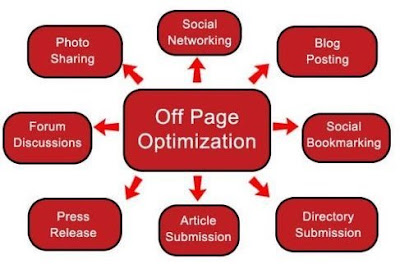SEO, Types and Techniques
SEO stands for “search engine optimization.” It’s the practice of increasing both the quality and quantity of website traffic, as well as exposure to your brand, through non-paid (also known as "organic") search engine results.
A. Search Engine Optimization
SEO is the process of getting traffic from the “free,” “organic,” “editorial” or “natural” search results on search engines. SEO is a methodology of strategies, techniques and tactics used to increase the number of visitors to a website by obtaining a high-ranking placement in the search results page of a SERP - including Google, Bing, Yahoo, and other search engines.
1. On-Site or On-Page SEO Marketing :
Refers to the activities that are carried out on the page that is to be published.On-page SEO is the practice of optimizing individual web pages to rank higher and earn more relevant traffic in search engines. On-page refers to both the content and HTML source code of a page that can be optimized
Refers to the activities that are carried out on the page that is to be published.
On-page SEO is the practice of optimizing individual web pages to rank higher and earn more relevant traffic in search engines. On-page refers to both the content and HTML source code of a page that can be optimized
The On-page SEO activities primarily Include infusing keywords in the right quantity, inserting internal links, meta tags, Meta description, building a customized URL structure, inserting the alt attributes, taking care of the image SEO and most importantly providing the users with quality content. Different on-site SEO elements are -
- Backlinking
- Title Tag
- Meta Description
- Wordpress Use
- Internal Linking
- Header Tags
- Inbound and Outbound links
- Image Names
- ALT Tags
- URL Structure
2. Off-Site or Off-Page SEO Marketing (Link Building):
Off-page SEO involves external optimization practices that happen away from your site rather than on it. The main technique used for off-page SEO is backlink building since quality backlinks to your site from external sites tell search engines that your site is valuable and high-quality, and this builds authority.
Some of the most popular off-site SEO practices are-
- Integration of SEO & Social Media
- Mobile Site Optimization
- Mobile App Streaming
- Social Community Group
- Blog Posts
- Forum Posting
- Social Bookmarking
- Social Media Engagement
- Exchange of Links
- Link Baiting
- Cross-Linking
- Photo Sharing
- Video Promotions
- Local Listings and Yellow Pages
- Press Release Promotion
- Classified Submission
- Business Listing
- Q & A
- Document Sharing
- CSS, W3C, & RSS Directories Submission
- Widget or Gadget Development
- PPC Ad Campaign
- Localizing Pricing and other Information
- Combining through Reports and Accessing ROI
- Compiling reviews from Multiple Sources
B. Factors that play a key role in Search Engine Optimization Marketing
The ranking in the search engines depends on so many factors, but fortunately working on only a few of them can ensure a better ranking for you. So, let us go through those factors and understand how they can help you in ensuring a better online presence -
(i) Domain Authority :
Domain Authority is a metric that was created by Moz (SaaS company), to rate a website on a scale of 1-100, (100 being the best and 1 being the worst). So, the higher the domain authority of a website, the higher it's ranking in search engines.
(ii) Keywords :
Keywords comprise another important factor for SEO Marketing. The right keywords can be brainstormed or even found out by the use of keyword tools such as Google's keyword planner. Keywords range from having low to high competition, based upon your keyword strategy you can use either low, medium or high competition keywords or a mixture of two.
(iii) Relevancy :
It will serve you well if you stick to high-quality original content rather than a copied one because search engines can also figure that out.
(iv) Links :
When you have relevant links on your website you can expect to get higher points on SEO. Between inbound and outbound links, the inbound links are more favored by search engines.
(v) URL Structure :
When it comes to URL structure, search engines favor the URLs, which are uncomplicated and easy to understand. Additionally, the URL needs to be descriptive as well as to the point.
(vi) Length of the Content :
The length of the content is another important factor that influences SEO. It has been found that when website articles or blogs are of greater length they rank higher. This means when you go for writing a blog post you should go for writing in detail on the subject.
Why is SEO important?
SEO is important because it’s specifically aimed at helping do just this; improve the online presence, traffic & ultimately goals for a website. In today’s competitive market, SEO marketing is more important than ever. Search engine optimization is important because:
- SEO is not only about search engines but good SEO practices improve the user experience and usability of a web site.
- Web sites with more than one author can benefit from SEO directly and indirectly. Their direct benefit is an increase in search engine traffic and their indirect benefit is having a common framework (checklists) to use before publishing content on the site.
While paid advertising, social media, and other online platforms can generate traffic to websites, the majority of online traffic is driven by search engines.
Organic search results cover more digital real estate, appear more credible to savvy searchers, and receive way more clicks than paid advertisements. SEO is also one of the only online marketing channels that, when set up correctly, can continue to pay dividends over time. If you provide a solid piece of content that deserves to rank for the right keywords, your traffic can snowball over time, whereas advertising needs continuous funding to send traffic to your site.
Optimizing your site will help deliver better information to search engines so that your content can be properly indexed and displayed within search results.






إرسال تعليق